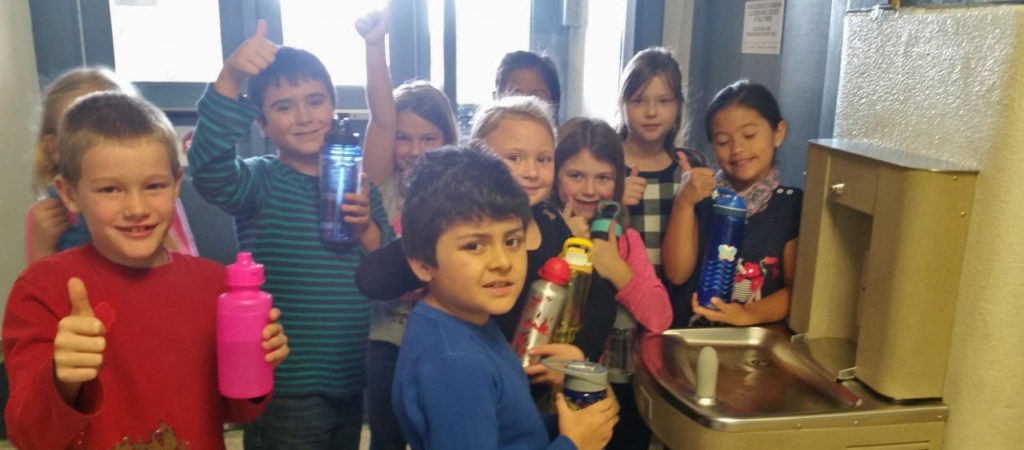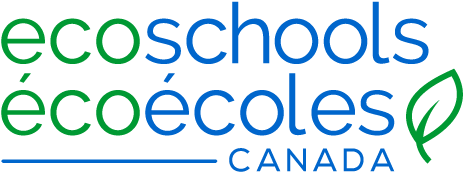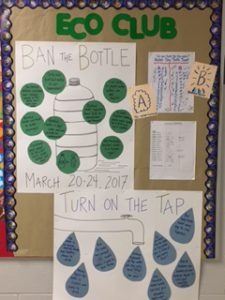
As part of our Climate Leadership Contest, we invited schools to share how they took climate action this school year for the chance to be entered into a prize draw sponsored by Cascades. This spring, we are continuing to share our winning schools’ stories!
In March, St. Michael Catholic Elementary School students chose to run a school-wide Ban the Bottle, Turn on the Tap campaign to coincide with World Water Day (March 22, 2017). This campaign integrated both environmental and social justice perspectives which underpin the need to act as stewards for precious water systems. The responses below are based on a condensed interview with the St. Michael CES EcoTeam.
What was the action you chose and how does it relate to climate change?
We chose to plan a Ban the Bottle, Turn on the Tap campaign. This relates to climate change because it will help establish environmentally-responsible practices around choosing reusable water bottles. As a school community, we know that single-use plastic bottles have devastating impacts on ecosystems. Our hope is to spark change in the habits of our school’s students and staff when it comes to connecting our individual behaviour to the environmental and human rights implications of commodifying water.
Can you share a few things students learned about the benefits of eschewing plastic water bottles in favour of reusable ones – from both environmental and human rights perspectives?
Students watched the video, The Story of Bottled Water that teaches the global impact of manufacturing and consuming bottled water. The video is very simple for students of all ages to understand; both the narrator and the animation clearly communicates the history of bottled water and where plastic water bottles end up at the end of their lifespan.
The Me to We Club also did announcements and sold rafiki bracelets specifically focusing on their Water Collection and leading discussions with students about clean, safe drinking water as a human right. These activities made us aware that we need to actively withdraw our support from companies that have turned water into a commodity by avoiding buying bottled water.
What shifts have you seen in student behaviour when it comes to reducing plastic waste?
We had a school-wide competition between classes to encourage the use of reusable water bottles as historically our students and staff were consuming a large number of plastic water bottles daily. The winning class received a Golden Water Bottle Award! Our principal was able to have a second water bottle filling station installed in our school over the March Break just a few days prior to our campaign. This new water bottle filling station is equipped with a filtration system and a digital readout of how many water bottles have been filled which has helped us change habits and encourage the eco-friendly use of reusable water bottles.
Where do you see areas for improvement?
Looking ahead, we are hoping to effect lasting change in our school and homes by continuing to inform our school community about the impacts of plastic water bottles on our environment globally and how continuing our environmentally-friendly habits can make a difference.
What other activities or water-themed lessons did you plan for World Water Day?
The EcoTeam held a water taste test during recesses on World Water Day. Students had the opportunity to try tap water vs. bottled water, and the Eco Team kept a tally of responses. At the end of the day, we revealed to the school community that tap water had won the taste test, but only by a small margin. Despite the results, we were able to encourage students and staff to save the money that they spend on bottled water and switch to reusable water bottles filled from our brand new filling station.
During Earth Hour activities which took place on March 24, one class undertook a water pollution experiment which drew from the learnings described above. Other classes got creative by using plastic water bottles from the recycling bins to make bird feeders that were hung on a school yard fence.
What other climate actions does your school have planned for this year?
We plan to participate in the David Suzuki Foundation’s Blue Dot campaign as well as build a butterfly garden in our school yard with a Buddy Bench facing it. We also participated in Earth Hour and Earth Week activities as a whole school and implemented regular ‘Lights Out Lunches’ to save energy.
Ontario EcoSchools Tips and further reading:
- Plan your own water campaign using our Water Awareness and Action Campaign Kit
- Get your EcoTeam together to watch episodes of the Water Brothers – an eco-adventure TV series. Follow up by discussing a particular episode and what actions you could take in your community to protect local water sources.
- Water bottle refill stations are an excellent way to switch from plastic to reusable water bottles – but we know they aren’t cheap. The Green Apple School Program offers grants for projects that support healthy eating habits. Check back in September 2017 for project ideas and deadlines.
- Connect water campaigns to curriculum expectations for Science and Technology. See just one example in our new Curriculum Map!
- Want to organize your own Ban the Bottle campaign? Find four simple tips.


Recent Comments